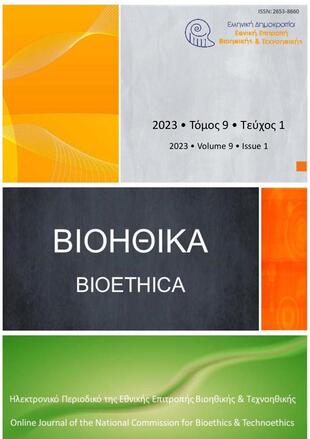Neuroethics
Abstract
This review was written in the framework of the Bioethics Course of the MSc Toxicology and is an attempt to briefly revise the history of the inconspicuous branch of Neuroethics, which, despite making a deafening appearance two decades ago, it gradually lost the interest of the scientific community. The reasons for the devaluation of a promising field like this are searched and thoroughly analyzed throughout the review, while this decline is attributed to the lack of semantic completeness and systematic methodology of the novice field and to the overall deceleration in the development of neurosciences. In addition, the article attempts to clearly define the terms and concepts that play a crucial role in the understanding of the field in question and cites a primitive classification system that includes Empirical Neuroethics, Theoretical Neuroethics and Methodological Neuroethics, with the latter being more of a wishful thinking rather than an applied scientific sub-discipline. Finally, some key contemporary issues in Neuroethics, such as informed consent, neurogenetics and the brain-spirit relationship, are discussed and commented on with reference to the principles of Philosophy and Theology.
Article Details
- How to Cite
-
Gouta, C. (2023). Neuroethics. Bioethica, 9(1), 37–49. https://doi.org/10.12681/bioeth.34073
- Section
- Reviews

This work is licensed under a Creative Commons Attribution 4.0 International License.
Authors who publish with this journal agree to the following terms:
- Authors retain copyright and grant the journal right of first publication with the work simultaneously licensed under a Creative Commons Attribution CC BY 4.0 License, which allows for immediate free access to the work and permits any user to read, download, copy, distribute, print, search, or link to the full texts of articles, crawl them for indexing, pass them as data to software, or use them for any other lawful purpose. Appropriate credit must be given by citing the author(s) and the original publication in this journal.
- Authors are able to enter into separate, additional contractual arrangements for the non-exclusive distribution of the journal's published version of the work (e.g. post it to an institutional repository or publish it in a book), with an acknowledgement of its initial publication in this journal.
We encourage authors to deposit their articles, as well as data underlying the publications, in institutional and/or other appropriate subject repositories.
Bioethica permits and encourages authors to archive the final publication pdf in institutional (e.g. the repository of the National Hellenic Research Foundation) or other appropriate subject repositories (e.g. SSOAR repository for social sciences), in compliance with institutional and/or funder open access policies, after publication in the BIOETHICA. Authors must provide bibliographic details that credit publication in the journal, as well as related funding details (when applicable).
Lists of institutional and other subject-based academic open access repositories can be found listed by country at the registry http://opendoar.org/countrylist.php
If your institution does not possess a repository you may deposit a copy of your paper at no cost with www.zenodo.org , the repository supported for open access research in the EU by the European Commission, through the project OpenAIRE (www.openaire.eu )



